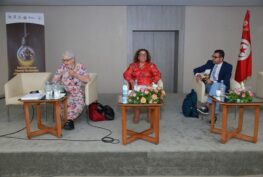Report of the public launch of the Action, Tunis 19 September 2017. Opening session
The moderator started the session by welcoming all the attendees, guests, and representatives of the embassies of Kuwait, Morocco, Yemen, Spain and Switzerland, and representatives of the General Administration of Prisons, Reform and Civil Society, and national and international organizations, presented the subject of the seminar, its stages and various expectations. After the presentation, the word was referred to the first intervention.
First intervention Elisabetta Zamparutti, representative of the Association of Hands off Cain, who expressed her happiness to be again a part in the activity with the Arab Institute for Human Rights in Tunisia, and then showed the evolution in the movement to advocate the abolition of the death penalty. Besides she indicated that the countries that had agreed to abolish the death penalty were increasing year after year and were now the majority in the world. However, the situation of the death penalty in the area of conflict and war calls for a lot of efforts. In this context, we are currently introducing a project to abolish the death penalty in the areas of the fight against terrorism, a three-year EU-supported project, mainly in Somalia, Egypt and Tunisia. It has a composition to support the principle of the right to life in the development of threats of violence. The fight against the death penalty is not just a law, but a way of thinking about managing the humanitarian issue. Human rights have a measure of power that calls on States to think about rights. The trust of the community in civil society organizations makes us to support these organizations to further educate on the respect of human rights. Violence should not be a violation of human rights, specifically the threat to the right to life. The death penalty is not a religious issue, but a political one. There are Islamic countries that do not apply the death penalty, and a Christian one does not apply them, and vice versa. We hope to draw attention to the fact that the abolition of the death penalty would enhance human dignity and contribute to development and would not encourage this to commit terrorist crimes.
The second aspect we focus on is to seek to gather as much information as possible on the death sentenced to raise awareness of the need to abolish the death penalty. And state of the ugliness of extracting life from a human being whatever his crime, the right to the media would support advocates of the abolition of the death penalty.
Second intervention: Mr. Roberto Giovene di Girasole, representative of the National Council of Lawyers in Italy, he thanked the Tunisian organizers and lawyers and expressed the honor he received while speaking in a country that recently won the Nobel Peace Prize. In which lawyers had a role in making this process a success. He pointed out in his speech that he came to Tunisia in 2011 and returned to it in 2015 after the terrorist Bardo events. The Council has signed a partnership with the Union of Lawyers in Tunis and has maintained contact with Tunisian lawyers. He also referred to the visit of Sousse and the setting of bouquets of flowers on its shores. Where the terrorist attack that has claimed the lives of dozens of European tourists to express the international solidarity of our organization with the families of the victims in resisting terrorism and shouting loudly: No to violence, yes to peace and democracy That is the slogan of the Council of Lawyers I represent. Lawyers have fought against violence and have sided with those who condemned the assassination of Shukri Belaid. The world today is in a critical position to support human rights. There are anti peace and democracy forces and we must resist those who spread terror. In order to win this war, we must engage and mobilize civil society organizations and forces in all countries of the Mediterranean. Terrorism must not be a pretext for some governments to commit violence and inferinge human rights. Terrorism must resisted in the respect of international conventions and human rights. Respect for human rights is the guarantor of peace and democracy, and we have no right to be discouraged when it comes to respecting laws and confronting coercive policies. The values of democracy make people the center of attention of civil rights defenders. If every human being and every lawyer becomes firmer in the defense of human rights, the situation will be better than ever in the future. Lawyers in Italy have played an important role in resisting forms of tyranny and contributed to the drafting of laws in the last century, including abolition of the death penalty and participated in sensitization campaigns against the death penalty. In Tunisia, the last death sentence was in 1990 and unfortunately the death penalty still applies in many countries. Italian lawyers support the sensitizating movement to abolish the death penalty and not tolerate the inhumane conditions of detainees. And rejected the idea of exceptional laws that are in conflict with international conventions against terrorism. That is the role of lawyers in our organization. We support this orientation through the EU program for the next three years.
Third intervention of Professor Abdel Sattar Ben Moussa, member of the Board of Trustees of the Arab Organization for Human Rights and Honorary President of the Tunisian League for the Defense of Human Rights in Tunisia. After welcoming the attendees. Since the World Day organized by the Global Coalition on October 10, 2016, the debate on the return to the death penalty has intensified under the pretext of countering the terrorist tide. The arguments of those who supported this position were to confront the evil of terrorist acts, but the arguments of those who opposed it were that it was a reversal of international human rights and the rise of crime in countries that applied the death penalty. In addition terrorists desire “Chahada” and their execution is an achievement of this requirement. He concluded by calling upon all organizations to abide by international conventions and to defend the right to life, which is the basis for the abolition of the death penalty.
The fourth intervention of Professor Jamal Musallam, president of the Tunisian League for the Defense of Human Rights in Tunisia, stated that the league, founded in 1977, was one of the first organizations to call for the abolition of the death penalty. As 77 death sentences have been issued since 2011 after the revolution. In drafting the constitution, the Association considered a historic opportunity to ratify the abolition of the death penalty in the Constitution, but we missed the opportunity in Tunisia, under the weight of public opinion, which is mostly against the abolition of the penalty, affected by the atrocity of terrorist crimes. In parallel, on many occasions, we have asked for a moratorium on executions or a change in the sentence to life imprisonment, which was the case after the events of bread during the rule of President Bourguiba. We did so with the conviction that the death penalty was being taken against political opponents to liquidate them, and because the facts proved that many cases had errors in legal proceedings. We hope to commend the positive steps of all human rights organizations to support the abolition of the death penalty. Let us work together in the coalition to abolish the death penalty to sensitize people and change their convictions to change their attitudes.
The Fifth Intervention of Mr. Abdelbaset Ben Hassan, Chairman of the Arab Institute for Human Rights: After welcoming the guests, representatives of the organizations and clubs of education on citizenship and human rights, he expressed his happiness at receiving the Arab Institute for Human Rights for the most authentic organizations defending the right to life, noting the Institute’s support for this movement more than twenty years ago since the international seminar was held in 1995 which opened a long path in order to think about a thorny and sinful issue that requires a lot of scientific, anthropological, philosophical, legal and religious knowledge, and a lot of developed jurisprudence for visions and convictions and also a lot of courage to face the mainstream and change it. The issue of combating the death penalty is in close relationship with crucial issues, and we view this issue as part of the evolution of the sanctions regime throughout history. It is an issue that requires answering the following fundamental questions: What is the meaning of life? What is the meaning of punishment? How do we face crime? These questions have answers at many levels, the security level, the legal level, and the mechanisms for the administration of justice in society. Today, there is an opportunity for the Arab Institute for Human Rights and its other partners to build a community culture that addresses these issues together.
Later, Ms. Mia Ben Khaled called Mr. Chokri Latif, head of the Tunisian Coalition for Abolition of the Death Penalty, and Nicolas Baroun, Director of the French organization “Together against the Death Penalty,” for honoring a number of representatives of the civic education clubs following their participation in an international competition entitled “Draw Me Abolition of the death penalty ” and the awards have been handed to:
Okba Ibn Nafii club in Kairaouan and the award was given to the student zanazen
Abu Al-Qassim Al-Chabi club in Tozeur and the award was given to the student Khouloud
2 March club in Kassrin and the award was given to the student Aymen
As the facilitators at the club also received certificates of participation in this event, namely Professors Abir, Ferjania and Alia.










No Comments